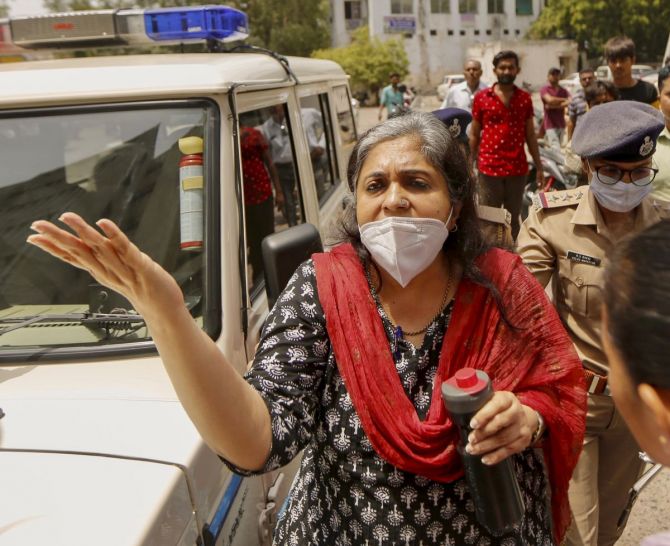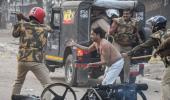'Politicians want pliable policemen who would carry out their orders, right or wrong, lawful or illegal.'

If you want to know what ails the police force and what needs to be done, then you have to read Prakash Singh's latest book, The Struggle for Police Reforms in India: Ruler's Police to People's Police.
The book tells you in detail what, when and why the police force started failing in its duties and surrendered to the whims and fancies of the political party in power.
A retired Indian Police Service officer, Singh has been battling for reforms in the police within the system and has also gone to courts over this issue.
In 1996, Singh filed a PIL in the Supreme Court seeking police reforms.
Ten years later, the Supreme Court in a landmark judgment in 2006, directed all states and Union Territories to bring in police reforms.
Singh says the apex court's ruling issued a series of measures that were to be undertaken by different states to ensure the police do their work without worrying about any political interference.
"The states are following this directive only where it suits them, otherwise it is observed more in the breach," Singh tells Rediff.com's Syed Firdaus Ashraf.
Sardar Vallabhbhai Patel was very optimistic that post-British rule, Indian policemen will be patriotic and motivated by the highest ideals of service to the country. Why did such high morals not come into practice in independent India's police force?
The first few generations of police officers and civil servants were fired by a sense of idealism.
They were patriotic and did their best while performing their duties.
However, as the years rolled by, the quality of politics showed a sharp deterioration.
This was reflected in the quality of services also.
Some kind of a nexus developed between the politicians and civil servants in general and police officers in particular.
This was glaring during the Emergency, when members of the Opposition were booked on fictitious charges and put behind bars.
During the 1984 anti-Sikh riots also, it was seen that the police remained a mute spectator to the hooliganism and vandalism of rioters simply because they belonged to the ruling party.
Do you feel the ills of our police system can be traced to the British Raj as they wanted domination over the native population and unfortunately that legacy continued? The only difference being that the white man was replaced by the brown man.
Yes, the ills of the police system that we have can be traced to the British Raj.
They wanted a 'politically useful' police and so they placed it under the control of the executive. However, it is regrettable that more than seven decades after Independence, even after these ills have been diagnosed and repeatedly pointed out by different commissions, we have not cared to rectify them and introduce the necessary changes indicated by the National Police Commission.
The gora sahibs have been replaced by the brown sahibs.
Why does the mention of the word 'police' create fear in the minds of the middle class rather than respect?
It is so because the common man sees the police as an instrument of the State and not an instrument of public service.
And so, every time the police are defending or vindicating the stand taken by the government on a particular issue, it finds itself pitted against sizeable sections of people, who are otherwise agitated over some issue. Use of force by the police on such occasions leaves a memory of bitterness and antipathy for the police.
How can this sense of alienation of the general public from the police force be eliminated?
This antipathy or alienation will go only if the police are allowed to enforce the rule of law without being subject to political pressures.
At present, they are subjected to all kinds of influences and pressures in their day-to-day functioning, pressures which favour one party or the other.
It will also be helpful if the police maintain good relations with the public, address their grievances and have a system of community policing on the ground.
The Supreme Court ruled in your case (2006) that transfers of police officers must be insulated from political control. Sixteen years later, how many states are following the apex court's directives?
The states are following this directive only where it suits them, otherwise it is observed more in the breach.
If the states have not implemented the Supreme Court guidelines, does it not tantamount to contempt of court? Why you did not pursue the case further with each state when they refused to follow the Supereme Court directives?
Contempt petitions were filed by me at different periods of time during the last 15 years.
A total of five such petitions were filed. Unfortunately, the Supreme Court, for reasons I cannot comment upon, never issued any contempt notices to the defaulting states.
In a democracy, 'people's will' is the most important way to measure the stability of the country. In this scenario, why will elected politicians pass the people's mandate of power to policemen?
I mean, elected representatives are ultimately responsible for the law and order situation so naturally they would like their favourites who are loyal to their party in plum postings, isn't it?
This is a convoluted expression of democracy.
The people select their representatives to represent them in the assembly.
As members of these assemblies or Parliament, their job is to lay down policies for the government and pass necessary laws.
Once the policies have been laid down or the laws have been passed, it is the function of the civil services, including the police, to implement them, and they should have functional autonomy in the matter.
Any interference in the day-to-day functioning of the civil services and the police amounts to the legislature trespassing into the domain of the executive.
All the three wings -- the executive, the legislature and the judiciary -- must operate within their designated areas defined by the Constitution.

Is it not true that the home minister's post is the most coveted as most chief ministers keep the home department with them so that they can keep a tight leash on the police force?
In this scenario, how can we expect any kind of change in the system when every chief minister wants control over the force?
We have all kinds of chief ministers in the country.
There are chief ministers who behave like taluqdars of the state they are heading, there are chief ministers who are, by and large, enlightened and want to promote the welfare of the people and bring about all-round progress in the state.
Democracy in the country has unfortunately developed serious aberrations with the result that we are seeing a gradually increasing percentage of criminals infiltrating into the elected bodies at the state and national levels. It is essential that the democratic process is cleaned up.
If the police and politicians have a system of dual authority, don't you think it will lead to anarchy in the country?
There is no question of dual system of authority.
The politician is supposed to lay down the policies and enact, wherever necessary, laws on the subject. It is for the government departments, including the police, to implement them.
Implementation does not mean interference. It presupposes operational autonomy for the department concerned.
Do you think we can become a country like Norway where the police fined the prime minister for violating Covid rules over a birthday party? Can this ever be possible in India?
It may not happen in the near future, but I visualise a day when that would also become possible in India.
It is just a question of letting the police function and enforce the rule of law.
You write in your book that you were told by one home secretary of Uttar Pradesh, 'Prakash, who wants to be an honest policeman?' Is this the feeling that most of the policemen feel across the country?
The question was slightly different.
The home secretary told me, 'Prakash, who wants an honest policeman?'
What he meant was that the politicians want pliable policemen who would carry out their orders, right or wrong, lawful or illegal. Honest policemen would tend to take a stand which the politicians do not like.
There is, generally speaking, no change in the situation. There are, however, some chief ministers who are prepared to hear dissenting opinions, but their number is very small.
Finally, what would your advice be for a new recruit who wants to be an upright, honest police officer, so that s/he does not fall into the web of the corrupt system?
No one can force you to be corrupt.
It is only when you want to follow the line of least resistance or decide to swim in the dirty current that you become corrupt.
My advice to young officers is always that they should start building their reputation from day one. If they do so, by the time they become seniors, they acquire an image which people willy-nilly respect.
They may not want you on a sensitive post, but they accept you and respect you for what you are.











 © 2025
© 2025